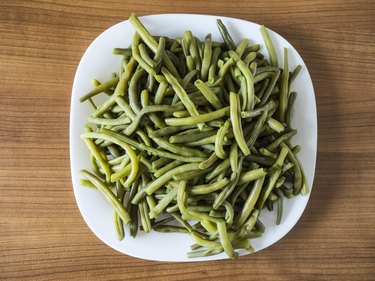
Vegetables provide essential vitamins, minerals and fiber and are low in calories when prepared correctly, such as. steaming, sautéing or boiling for a short time. The leftover water after cooking leafy greens like spinach and lettuce and cruciferous vegetables such as broccoli and kale also contains nutrients and can be used in other recipes.
Saving vegetable water to repurpose for preparing other dishes is a popular practice among home cooks and professional chefs alike. Besides containing trace nutrients that leach out from the cooked vegetables into the pan water, this liquid essence can be used for cooking dishes such as pasta, rice, soups and stews. Saving vegetable water is also a good way to conserve in your cooking and be less wasteful while adding nutrients.
Video of the Day
Video of the Day
Healthiest Ways to Cook Vegetables
Vegetables start to lose small amounts of nutrients after being picked and the longer they sit in grocery stores uneaten the more likely they are to over-ripen or spoil; buying seasonal and fresh matters. Another option is flash-frozen vegetables, which are picked when ripe and then rapidly frozen to preserve optimum flavor and nutritional value. Most vegetables consist of over 90 percent water. Other examples in addition to spinach, include lettuce, bok choy, zucchini and celery, among others
During the cooking process nutrients are leached into the leftover water in the pan. How you cook vegetables matters, since many lose nutrients during the cooking process, especially water-soluble vitamins B, C and folate. Spinach and other leafy greens and crucifer broccoli
An April, 2018 study in Food and Science Biotechnology reported that a team of scientists in Korea evaluated four different cooking methods, comprising blanching, boiling, microwaving and steaming, on ten different types of vegetables, to determine which process causes the least nutrient depletion. The study concluded that results varied by type of vegetable but, overall, microwaving or simmering vegetables for a short time caused the least disruption of nutrients, while boiling caused the most disruption.
Cooking with Vegetable Water
Repurposing the liquid left in the pot after cooking vegetables is nothing new. Home cooks and professional chefs have used this technique for a long time, to avoid wasting any part of food and its byproducts.
Cooks in the southern states even have a term for it, "pot liquor (or pot likker),"explains John T. Edge, director of the Southern Foodways Alliance, in his spring, 2014 article "The State of the Broth" in Oxford American Magazine. Of course, the southern tradition of adding savory pork bits to flavor the cooking water hardly makes it healthier, but does impart some great flavor.
Saving your vegetable water provides a low-fat, nutritious cooking broth for pasta, rice and dumplings, soups and sautés, and even braising and pan roasts. Add your choice of fresh herbs and spices for flavoring.
Almost any cooked vegetable produces a lightly-fragrant water that can be utilized in different recipes. Examples include leftover cooking water from potatoes, spinach, broccoli mushrooms and tomatoes. The aromas and flavors are all different, so try experimenting.
Read more: The Nutrition in Vegetable Broth
Hydrate with Vegetable Water
Drinking vegetable water is also a handy way to stay hydrated while adding nutrients but not calories. For warmer beverage options, steep vegetable water with fresh or dried herbs, and then sip it like a soothing tea. Or, save your vegetable water to mix with broths, including chicken broth, beef broth or other vegetable broths, to create a flavorful soup stock.
Read more: How Can I Tell When My Body Is Hydrated
Chilled vegetable water can be used for cocktails, added to flavor iced teas, or blended into smoothies. Keep vegetable water refrigerated in a sealed container to retain its nutrients, and use in a few days, or freeze it to preserve nutrients longer and use the liquid at a later date. Another idea is to freeze vegetable water in ice cube trays to use in cold drinks, or to reheat in a mug to make vegetable bouillon. Saving your vegetable water and repurposing adds a fun, creative dimension to the old adage "eat your vegetables."
- USDA Nutrition: "Vegetables with High Water Content," July 26, 2019
- Food and Drug Administration (FDA): "Fortify Your Knowledge About Vitamins"
- Food Science and Biotechnology: “Effect of Different Cooking Methods on the Content of Vitamins and True Retention in Selected Vegetables," April 2018
- Oxford American Magazine: "The State of the Broth," John T. Edge, March 12, 2014
- John T. Edge, Director, Southern Foodways Alliance
- T Colin Campbell Center for Nutrition Studies: “Why Vegetable Mineral Broth is Healthier Than Bone Broth,” November 20, 2018
- Centers for Diease Control and Nutrition (CDC): How to Use Fruits and Vegetables to Help Manage Your Weight